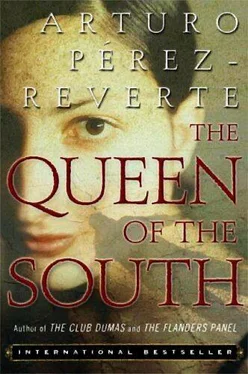Arturo Perez-Reverte - Queen of the South
Здесь есть возможность читать онлайн «Arturo Perez-Reverte - Queen of the South» весь текст электронной книги совершенно бесплатно (целиком полную версию без сокращений). В некоторых случаях можно слушать аудио, скачать через торрент в формате fb2 и присутствует краткое содержание. Жанр: Триллер, на английском языке. Описание произведения, (предисловие) а так же отзывы посетителей доступны на портале библиотеки ЛибКат.
- Название:Queen of the South
- Автор:
- Жанр:
- Год:неизвестен
- ISBN:нет данных
- Рейтинг книги:5 / 5. Голосов: 1
-
Избранное:Добавить в избранное
- Отзывы:
-
Ваша оценка:
- 100
- 1
- 2
- 3
- 4
- 5
Queen of the South: краткое содержание, описание и аннотация
Предлагаем к чтению аннотацию, описание, краткое содержание или предисловие (зависит от того, что написал сам автор книги «Queen of the South»). Если вы не нашли необходимую информацию о книге — напишите в комментариях, мы постараемся отыскать её.
Queen of the South — читать онлайн бесплатно полную книгу (весь текст) целиком
Ниже представлен текст книги, разбитый по страницам. Система сохранения места последней прочитанной страницы, позволяет с удобством читать онлайн бесплатно книгу «Queen of the South», без необходимости каждый раз заново искать на чём Вы остановились. Поставьте закладку, и сможете в любой момент перейти на страницу, на которой закончили чтение.
Интервал:
Закладка:
"It must be," she added, "if you're here today. Must be really important."
I looked at the pistol. A SIG-Sauer. Swiss. Fifteen 9-millimeter cartridges per clip, in three neat staggered rows. And three full clips. The gold-colored tips of the bullets were as thick as acorns.
"Yes," I answered coolly. "Twelve years ago. Sinaloa."
Again the contemplative silence. She knew about me, because in her world, knowledge could be bought. And besides, three weeks earlier I'd sent her a copy of my unfinished piece. It was the bait. The letter of introduction so I could get what I needed and finish the story off.
"Why should I tell you about that?"
"Because I've gone to a lot of trouble over you."
She was looking at me through the cigarette smoke, her eyes slightly Mongolian, somehow, like the masks at the Templo Mayor. She got up and went over to the bar and came back with a bottle of Herradura Reposado and two small, narrow glasses, the ones the Mexicans call caballitos, "little horses." She was wearing comfortable dark linen pants, a black blouse, and sandals, and I noticed that she was wearing no diamonds, no stones of any kind, no gold chain around her neck, no watch-just a silver semanario on her right wrist, the seven silver bangles I'd learned she always wore. Two years earlier-the press clippings were in my room at the Hotel San Marcos- the Spanish society magazine Hola! had included her among the twenty most elegant women in Spain. At about the same time, El Mundo ran a story about the latest police investigation into her business dealings on the Costa del Sol and her links with drug traffickers. In the photo, published on page one, you could see her in a car with the windows rolled up partway, protected from reporters by several bodyguards in dark glasses. One of them was the heavyset guy with the moustache who was sitting at the other end of the room now, looking at me as though he weren't looking at me.
"A lot of trouble," she repeated pensively, pouring tequila into the glasses.
"Right."
She sipped at it, standing up, never taking her eyes off me. She was shorter than she looked in photos or on television, but her movements were still calm and self-assured-each gesture linked to the next naturally, as though there were no possibility of improvisation or doubt. Maybe she never has any doubts about anything anymore, I suddenly thought. At thirty-five, she was still vaguely attractive. Less, perhaps, than in recent photographs and others I'd seen here and there, kept by people who'd known her on the other side of the Atlantic. That included her profile in black-and-white on an old mugshot in police headquarters in Algeciras. And videotapes, too, jerky images that always ended with big gruff gorillas entering the frame to shove the lens aside. But in all of them she was indisputably Teresa, with the same distinguished appearance she presented now-wearing dark clothes and sunglasses, getting into expensive automobiles, stepping out onto a terrace in Marbella, sunbathing on the deck of a yacht as white as snow, blurred by the telephoto lens: it was the Queen of the South and her legend. The woman who appeared on the society pages the same week she turned up in the newspapers' police blotter.
But there was another photo whose existence I knew nothing about, and before I left that house, two hours later, Teresa Mendoza unexpectedly decided to show it to me: a snapshot wrinkled and falling apart, its pieces held together with tape crisscrossing the back. She laid it on the table with the full ashtray and the bottle of tequila of which she herself had drunk two-thirds and the SIG-Sauer with the three clips lying there like an omen-in fact, a fatalistic acceptance-of what was going to happen that night.
As for that last photo, it really was the oldest of all the photos ever taken of her, and it was just half a photo, because the whole left side was missing. You could see a man's arm in the sleeve of a leather aviator jacket over the shoulders of a thin, dark-skinned young woman with full black hair and big eyes. The young woman was in her early twenties, wearing very tight pants and an ugly denim jacket with a lambskin collar. She was facing the camera with an indecisive look about halfway down the road toward a smile, or maybe on the way back. Despite the vulgar, excessive makeup, the dark eyes had a look of innocence, or a vulnerability that accentuated the youthful-ness of the oval face, the eyes slightly upturned into almond-like points, the very precise mouth, the ancient, adulterated drops of indigenous blood manifesting themselves in the nose, the matte texture of the skin, the arrogance of the uplifted chin. The young woman in this picture was not beautiful, but she was striking, I thought. Her beauty was incomplete, or distant, as though it had been growing thinner and thinner, more and more diluted, down through the generations, until finally what was left were isolated traces of an ancient splendor. And then there was that serene-or perhaps simply trusting-fragility. Had I not been familiar with the person, that fragility would have made me feel tender toward her. I suppose. "I hardly recognize you."
It was the truth, and I told it. She didn't seem to mind the remark; she just looked at the snapshot on the table. And she sat there like that for a long time.
"Me, either," she finally said.
Then she put the photo away again-first in a leather wallet with her initials, then in the purse that was lying on the couch-and gestured toward the door. "I think that's enough," she said.
She looked very tired. The long conversation, the tobacco, the bottle of tequila. She had dark circles under her eyes, which no longer resembled the eyes in the old snapshot. I stood up, buttoned my jacket, put out my hand- she barely brushed it-and glanced again at the pistol. The fat guy from the other end of the room was beside me, indifferent, ready to see me out. I looked down, intrigued, at his splendid iguana-skin boots, the belly that spilled over his handworked belt, the menacing bulge under his denim jacket. When he opened the door, I saw that what I took as fat maybe wasn't, and that he did everything with his left hand. Obviously his right hand was reserved as a tool of his trade.
"I hope it turns out all right," I said.
She followed my gaze to the pistol. She nodded slowly, but not at my words. She was occupied with her own thoughts. "Sure," she muttered.
Then 1 left. The same Federates with their bulletproof vests and assault weapons who had frisked me from head to toe when I came in were standing guard in the entry and the front garden as I walked out. A military jeep and two police Harley-Davidsons were parked next to the circular fountain in the driveway. Five or six journalists and a TV camera were under a canopy outside the high walls, in the street: they were being kept at a distance by soldiers in combat fatigues who were cordoning off the grounds of the big house. I turned to the right and walked through the rain toward the taxi that was waiting for me a block away, on the corner of Calle General Anaya.
Now I knew everything I needed to know, the dark corners had been illuminated, and every piece of the history of Teresa Mendoza, real or imagined, now fit: from that first photograph, or half-photograph, to the woman I'd just talked to, the woman who had an automatic lying out on the table.
The only thing lacking was the ending, but I would have that, too, in a few hours. Like her, all I had to do was sit and wait.
Twelve years had passed since the afternoon in the city of Culiacan when Teresa Mendoza started running. On that day, the beginning of a long round-trip journey, the rational world she thought she had built in the shadow of Guero Davila came crashing down around her, and she suddenly found herself lost and in danger.
She had put down the phone and sat for a few seconds in cold terror. Then she began to pace back and forth across the room, opening drawers at random, blind with panic, knowing she needed a bag to carry the few things she needed for her escape, unable at first to find one. She wanted to weep for her man, or scream until her throat was raw, but the terror that was washing over her, battering her like waves, numbed her emotions and her ability to act. It was as if she had eaten a mushroom from Huautla or smoked a dense, lung-burning joint, and been transported into some distant body she had no control over.
Читать дальшеИнтервал:
Закладка:
Похожие книги на «Queen of the South»
Представляем Вашему вниманию похожие книги на «Queen of the South» списком для выбора. Мы отобрали схожую по названию и смыслу литературу в надежде предоставить читателям больше вариантов отыскать новые, интересные, ещё непрочитанные произведения.
Обсуждение, отзывы о книге «Queen of the South» и просто собственные мнения читателей. Оставьте ваши комментарии, напишите, что Вы думаете о произведении, его смысле или главных героях. Укажите что конкретно понравилось, а что нет, и почему Вы так считаете.












